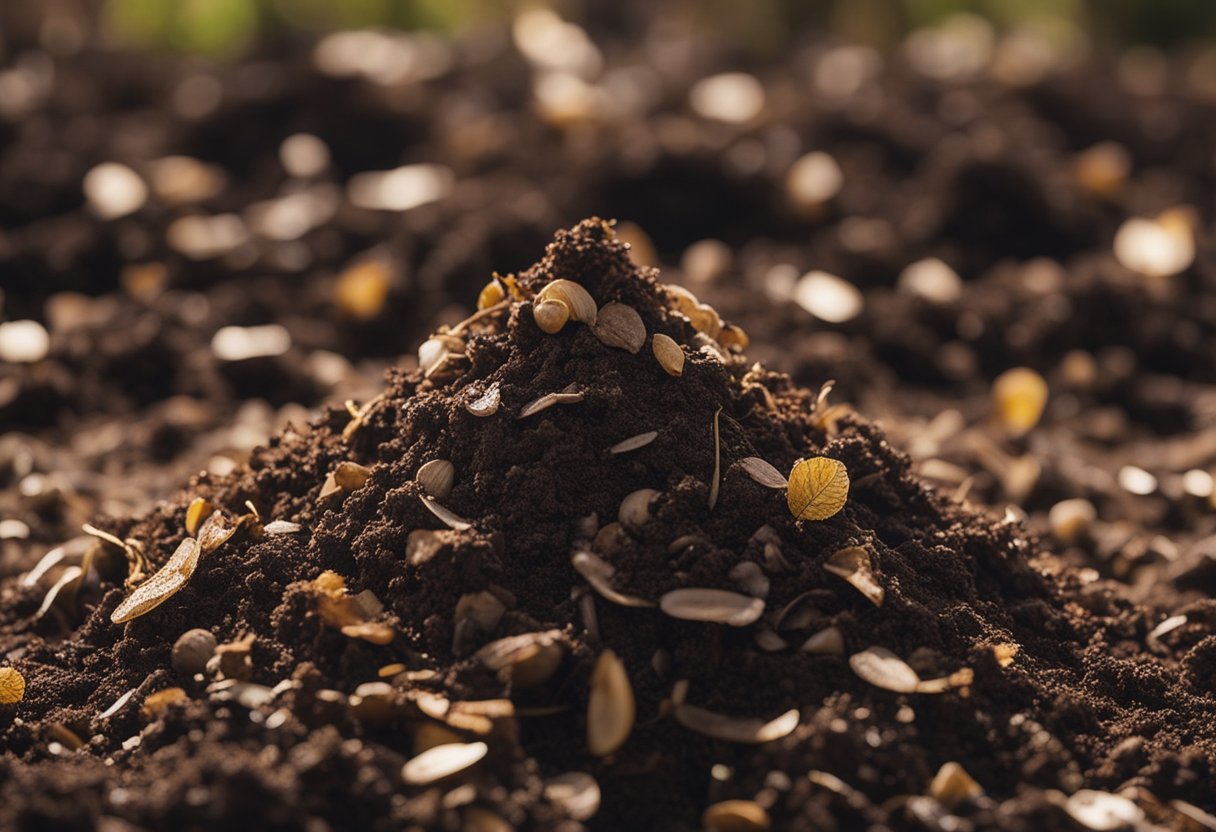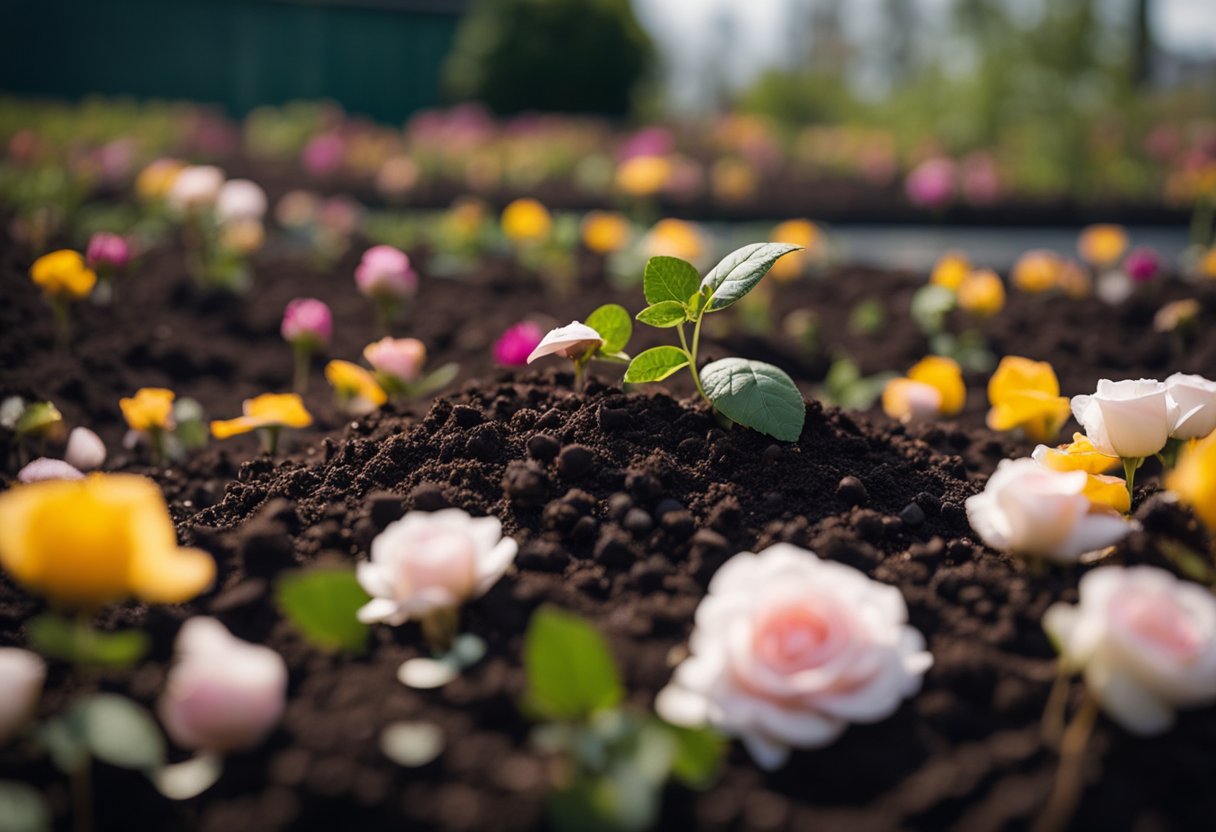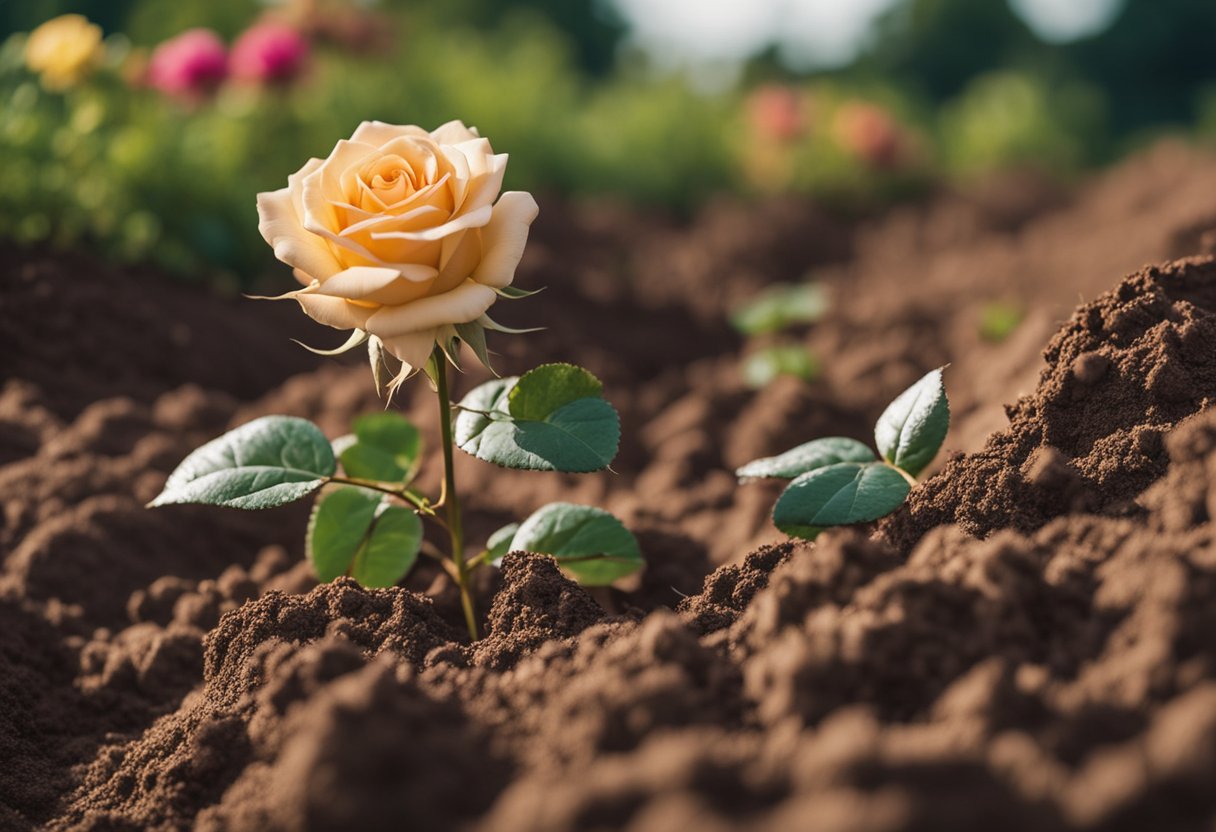As an Amazon Associate I earn from qualifying purchases.
At A Glance
Yes, you can compost roses. Rose cuttings, leaves, and petals are all organic materials that will decompose over time in a compost pile. They are considered “green” compost material, providing necessary nitrogen to help break down “brown” materials like dry leaves or twigs. It’s advisable to cut or shred the roses into smaller pieces to expedite the decomposition process. However, if your roses have been treated with pesticides or other chemicals, it might be best to avoid composting them, or ensure they are thoroughly cleaned before adding to your compost pile to prevent any potential contamination.
Composting is a great way to recycle plants back into the soil, and it’s an excellent way to reduce waste. Many people compost their kitchen scraps, yard waste, and other organic materials to create nutrient-rich soil for their gardens. However, not all plants are suitable for composting, and some require special care.
One question that often comes up is whether you can compost roses. The answer is yes, you can compost roses, but there are a few things to keep in mind. First, you should only compost the flowers, soft green stems, and leaves of the rose bush. Other parts of the rose bush, such as the thorns and woody stems, take longer to break down and can be difficult to compost. Additionally, if your roses have been treated with pesticides or other chemicals, you should avoid composting them, as these chemicals can harm the beneficial microorganisms in your compost pile.
When composting roses, it’s important to remember that they are heavy feeders and require nutrient-rich soil to thrive. You can add compost to your garden beds to improve the soil quality and provide your roses with the nutrients they need. Additionally, you can create a compost tea by steeping compost in water and using the resulting solution to water your roses. This will provide them with a quick boost of nutrients and help them grow strong and healthy.
Understanding Composting

The Basics of Compost
Composting is a natural process of breaking down organic matter into a nutrient-rich soil amendment. The process involves creating an environment where microorganisms like bacteria, fungi, and worms can thrive and break down the organic matter. The resulting compost is a dark, crumbly substance that can be used to improve soil health and plant growth.
Role of Organic Matter in Compost
Organic matter is the key ingredient in composting. It includes plant materials such as leaves, grass, and kitchen scraps, as well as animal manure. Organic matter provides the carbon and nitrogen that microorganisms need to break down the material. It also helps to aerate the compost pile and retain moisture.
Composting Roses: Can It Be Done?
Roses are a popular garden plant, but can they be composted? The answer is yes, with a few exceptions. According to Compost Guide, the flowers, soft green stems, and leaves of rose bushes can be added to your compost bin. However, avoid adding thorny stems and branches, diseased leaves and flowers, and plants treated with pesticides or chemicals. These materials may not break down properly and can harm the microorganisms in the compost pile.
When composting roses, it’s important to chop the material into small pieces to speed up the decomposition process. Mixing in other organic materials like grass clippings, leaves, and kitchen scraps can also help to balance the carbon-to-nitrogen ratio and improve the quality of the compost.
Overall, composting is a great way to reduce waste and improve soil health. By understanding the basics of composting and the role of organic matter, you can create a nutrient-rich soil amendment that will benefit your garden and the environment.
The Importance of Soil pH and Nutrients

As a gardener, it is important to understand the role of soil pH and nutrients when it comes to growing healthy plants. Soil pH is a measure of how acidic or alkaline the soil is. Most plants prefer a soil pH in the range of 6.0 to 7.0, which is slightly acidic to neutral. Understanding soil pH is important because it affects how well plants can access nutrients in the soil.
Understanding Soil pH
Roses prefer a soil pH close to the typical level for ordinary garden soil, which is slightly acidic to neutral. If the soil is too acidic or alkaline, it can affect the availability of nutrients in the soil, which can lead to poor plant growth and health. For example, if the soil is too acidic, it can make it difficult for plants to absorb nutrients such as phosphorus, potassium, and calcium. On the other hand, if the soil is too alkaline, it can make it difficult for plants to absorb nutrients such as iron, manganese, and zinc.
To determine the pH of your soil, you can use a pH testing kit or send a soil sample to a lab for analysis. If the pH of your soil is too acidic, you can add lime to raise the pH. If the pH is too alkaline, you can add sulfur to lower the pH.
The Role of Nutrients in Plant Growth
In addition to soil pH, it is important to understand the role of nutrients in plant growth. Plants require a variety of nutrients to grow and thrive, including nitrogen, phosphorus, and potassium. Nitrogen is important for leaf growth, while phosphorus is important for root growth and flower production. Potassium is important for overall plant health and helps plants resist disease and stress.
When composting roses, it is important to ensure that the compost is balanced and contains a variety of nutrients. Composting rose flowers can give your garden and the earth a healthy boost. However, it is important to keep the balance and be patient. Compost can increase the acidity level in the soil, so you need to ensure that your compost is not too acidic. This would put the soil pH outside of the ideal range for roses.
In conclusion, understanding soil pH and nutrients is important when it comes to growing healthy roses. By ensuring that your soil has the right pH and contains a variety of nutrients, you can help your roses grow and thrive.
Choosing the Right Compost for Roses
Roses are beautiful and delicate flowers that require specific growing conditions to thrive. One of the most important factors to consider when growing roses is the type of compost you use. In this section, I will discuss what to look for in compost for roses and the best compost options available.
Compost for Roses: What to Look For
When choosing compost for roses, there are several factors to consider. The first is the pH level of the compost. Roses prefer a slightly acidic soil with a pH between 6.0 and 6.5. If the pH level is too high or too low, the plant may not thrive.
Another important factor to consider is the nutrient content of the compost. Roses require a balanced mix of nutrients, including nitrogen, phosphorus, and potassium. A good compost for roses should contain these nutrients in the right proportions.
Finally, it is important to choose a compost that is well-draining. Roses do not like to sit in wet soil, as this can lead to root rot and other problems. Look for a compost that is light and fluffy, with good drainage properties.
Best Compost for Roses
There are several types of compost that are well-suited for roses. Here are some of the best options:
- Well-matured compost with well-composted manure is an excellent choice for roses. This type of compost provides a good balance of nutrients and helps to maintain the pH level of the soil.
- Mushroom compost is another good option for roses. It is rich in nutrients and helps to improve soil structure.
- Ericaceous compost is a good choice if you have acidic soil. This type of compost is specifically designed for acid-loving plants like roses.
- Blood meal and bonemeal are excellent sources of nitrogen and phosphorus, respectively. These can be added to compost to boost its nutrient content.
- Epsom salts can also be added to compost to provide a source of magnesium, which is important for healthy plant growth.
In addition to compost, you may also want to consider using mulch and fertilizer to help your roses thrive. Mulch helps to retain moisture in the soil, while fertilizer provides additional nutrients. However, it is important to use these products in moderation, as too much can be harmful to your plants.
In conclusion, choosing the right compost for roses is essential for healthy plant growth. Look for a compost that is slightly acidic, nutrient-rich, and well-draining. Consider using additional products like mulch and fertilizer to help your roses thrive. With the right growing conditions, your roses will bloom beautifully year after year.
Soil Types and Their Effects on Roses

Understanding Different Soil Types
Before we talk about the best soil mix for roses, let’s first understand the different soil types and their effects on roses. Soil is composed of three main components: sand, silt, and clay. The ideal soil for roses is loamy soil, which is a mixture of all three components in roughly equal parts.
Clay soil is dense and heavy, and it tends to hold onto water, which can lead to root rot in roses. Sandy soil, on the other hand, is very porous and drains too quickly, which can lead to dehydration in roses. Loam soil, as mentioned earlier, is the ideal soil type for roses. It has good drainage and water retention properties, and it allows air to circulate around the roots.
Best Soil Mix for Roses
When it comes to the best soil mix for roses, we want to mimic loam soil as closely as possible. To achieve this, we need to amend the soil with organic matter. Organic matter can be anything from compost to leaf mold to well-rotted manure.
A good rule of thumb is to mix one part organic matter with two parts soil. This will provide the necessary nutrients for the roses to thrive. Another option is to use a pre-made soil mix specifically designed for roses. These mixes are usually composed of a combination of peat moss, perlite, vermiculite, and compost.
In summary, the best soil mix for roses is loamy soil amended with organic matter. This will provide the necessary nutrients and water retention properties for the roses to grow healthy and strong.
Compost and Water Management
As with any plant, proper water management is essential for the health of roses. However, the type of soil and compost used can also play a significant role in water retention and drainage.
Water Retention and Drainage
When it comes to compost, roses thrive in loamy soil composed of sand, silt, and small amounts of clay. This type of soil allows for adequate drainage while still retaining enough moisture for the plants to grow. Compost that is too heavy in clay can lead to waterlogged soil, which can cause root rot and other issues. On the other hand, compost that is too sandy may not retain enough moisture, leading to dry soil and stressed plants.
To ensure proper water retention and drainage, it’s important to choose the right compost for your roses. Compost made from organic materials such as nutrient-rich decaying plant matter or manure is ideal. Additionally, adding organic matter to the soil can help improve its water retention and drainage capabilities.
Watering Roses: Best Practices
When it comes to watering roses, it’s important to strike a balance between too much and too little water. Overwatering can lead to waterlogged soil, while underwatering can cause the plants to become stressed and wilted.
To avoid these issues, it’s best to water roses deeply but infrequently. This encourages deep root growth and helps the plants become more drought-resistant. Additionally, watering in the morning or evening when the temperatures are cooler can help reduce water loss due to evaporation.
It’s also important to water at the base of the plants rather than overhead. This helps prevent water from sitting on the leaves, which can lead to fungal diseases such as blackspot.
In summary, proper water management is essential for the health of roses. Choosing the right compost and watering practices can help ensure adequate water retention and drainage, leading to healthy, thriving plants.
Planting and Feeding Roses
Roses are a beautiful addition to any garden, but they require specific conditions to thrive. Proper planting and feeding are essential to ensure optimal growth and a bountiful bloom.
Planting Roses for Optimal Growth
When planting roses, it’s important to choose a location that receives at least six hours of direct sunlight per day. The soil should be well-draining and rich in organic materials, such as garden compost or well-rotted manure. To improve drainage, consider adding perlite or vermiculite to the soil mix.
Before planting, dig a hole that is twice as wide and deep as the root ball. Gently remove the rose from its container and loosen any tangled roots. Place the plant in the hole and backfill with soil, firming it around the base of the plant. Water thoroughly to settle the soil.
Feeding Roses: When and How
Feeding roses is essential to ensure healthy growth and a beautiful bloom. Organic materials, such as alfalfa and coffee grounds, can be added to the soil to provide nutrients.
To feed roses, apply a balanced fertilizer in early spring, just as new growth begins. Repeat every four to six weeks throughout the growing season. Be sure to follow the manufacturer’s instructions for application rates.
In addition to fertilizer, compost tea can be used to provide a nutrient boost to the root zone. To make compost tea, combine one cup of compost or well-rotted manure with one gallon of water. Allow it to sit for a week before using the solution.
In conclusion, proper planting and feeding are essential to ensure optimal growth and a bountiful bloom for roses. By selecting the right location, soil mix, and feeding regimen, you can enjoy beautiful roses in your garden for years to come.
Managing Pests and Diseases
As with any garden, pests and diseases can be a problem for rose gardens. However, with proper care and attention, you can keep your roses healthy and pest-free.
Common Pests in Rose Gardens
Some common pests that can affect roses include aphids, spider mites, and thrips. Aphids are small insects that can suck the sap from the leaves and stems of roses, causing them to wilt and die. Spider mites are tiny arachnids that can spin webs on the leaves and buds of roses, causing them to turn yellow and fall off. Thrips are small, winged insects that can cause damage to the buds and flowers of roses, causing them to become deformed and discolored.
To prevent these pests from infesting your rose garden, it’s important to keep your roses healthy and well-maintained. This includes regular watering, fertilizing, and pruning. You can also use natural methods to control pests, such as introducing beneficial insects like ladybugs and lacewings, or spraying your roses with a mixture of water and dish soap.
Preventing Diseases in Roses
In addition to pests, roses are also susceptible to a variety of diseases, such as powdery mildew, black spot, and rust. Powdery mildew is a fungal disease that can cause a white powdery coating to form on the leaves and stems of roses, while black spot is a fungal disease that can cause black spots to form on the leaves. Rust is another fungal disease that can cause orange or yellow spots to form on the leaves and stems of roses.
To prevent these diseases from affecting your roses, it’s important to keep your roses healthy and well-maintained. This includes regular watering, fertilizing, and pruning. You can also use natural methods to control diseases, such as removing infected leaves and stems, or spraying your roses with a mixture of water and baking soda.
In addition, it’s important to keep your rose garden free of weeds, as weeds can harbor pests and diseases that can spread to your roses. You can prevent weeds from growing by using mulch or by hand-pulling them as soon as they appear.
By following these tips, you can keep your rose garden healthy and beautiful all season long.
Growing Roses: Tips and Tricks
As a gardener, I’ve learned a few tips and tricks for growing beautiful roses. Here are some things to keep in mind:
-
Choose the right location: Roses need plenty of sunlight and well-draining soil to thrive. Make sure to choose a location that gets at least six hours of direct sunlight each day and has soil that drains well.
-
Prepare the soil: Before planting your roses, it’s important to prepare the soil. Roses prefer loamy soil that is composed of sand, silt, and small amounts of clay. You can also add organic materials like compost or manure to the soil to help improve its texture and nutrient content.
-
Water regularly: Roses need regular watering, especially during hot, dry weather. Make sure to water deeply and avoid getting water on the leaves, as this can encourage fungal diseases.
-
Prune regularly: Pruning is an important part of rose care. It helps to promote healthy growth and remove dead or diseased wood. Prune your roses in the early spring before new growth begins.
-
Fertilize as needed: Roses benefit from regular fertilization. You can use a balanced fertilizer or one that is specifically formulated for roses. Be careful not to over-fertilize, as this can lead to excessive foliage growth and fewer blooms.
By following these tips and tricks, you can grow beautiful, healthy roses in your garden.
